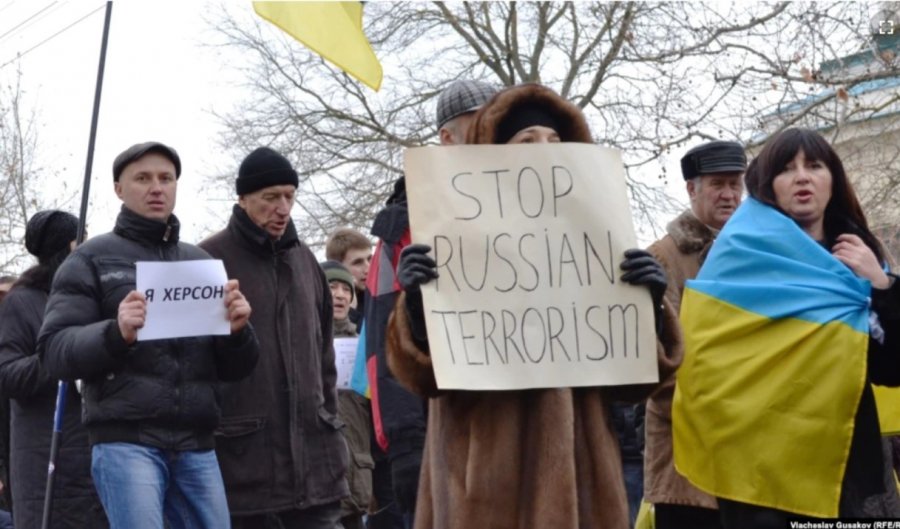
Russian attempts to foist their educational program on occupied Kherson oblast schools have encountered resistance with virtually none of the school directors willing to collaborate. This is despite the abductions and other methods of terror which the Russian invaders are applying in all areas temporarily under their control.
Ukrinform reported on 26 May that regional educationalists had either not come to a meeting organized by the Russian invaders and local collaborators, or had demonstratively left. Their sources, who can obviously not be named, told them that Tetiana Kuzmich, accompanied by armed Russian soldiers, personally delivered the ‘invitations’ to a meeting with the self-styled ‘Kherson regional military-civilian administration’. Despite the fact that they had to sign that they had received these ‘invitations’, just over 20 people from the 61 schools in Kherson turned up at the meeting on 26 May, with many of these not school heads.
Kuzmich was facing serious treason charges in Ukraine, as allegedly being involved in a Russian FSB network, before Russia’s full-scale invasion. Now, under Russian occupation, she is claimed to be the head of education within the so-called ‘Kherson regional military-civilian administration’ (i.e. the occupation regime). The 26 May meeting was also attended by the Russian-appointed ‘governor’ of his occupation regime, Volodymyr Saldo, and two other collaborators – Serhiy Cherevko and Kyrylo Stremousov, both of whom have been installed by the Russians as Saldo’s ‘deputies’. It was noted that Saldo was wearing a bullet-proof vest, with the teachers concluding that he obviously fears for his life, even at a meeting with educationalists.
Kuzmich attempted to convince the educationalists present that Kherson schools would work according to the Russian curriculum and would change to teaching in Russian. The educationalists were invited to collaborate in this and offered ‘protection’.
Saldo apparently asserted that the teachers’ very presence at the meeting indicated support for the occupation regime. The teachers were not having this. They said that they had come merely to find out what was happening and stated clearly that this did not mean they supported it. They asked if they could leave if they didn’t agree. When told that they could, virtually all of them got up and left.
Writing for the Centre for Journalist Investigations, Kherson journalist Oleh Baturin reports that the resistance from local educationalists is not just seen in the small number who first ended, and then walked out of, the meeting with local collaborators. The latter are also having difficulty finding staff. A recent ‘training trip’ to occupied Crimea only got around ten takers, with a considerable percentage of the self-proclaimed heads or those aspiring to such places, having no relation to education.
The situation is the same in occupied Kakhovka, where local educationalists have refused to collaborate with the new Russian-foisted ‘leaders’. A Kakhovka teacher, on condition of anonymity, told the Centre that the local collaborator installed as ‘head’ by the Russians, Pavlo Filipchuk, had claimed to have held meetings with school heads, other educationalists and cultural workers. In his version of events, they had all expressed willingness to collaborate. The source, however, points out that such reports have not once been backed by photos or videos, and suggests that this is because almost nobody turned up to such ‘meetings’, and not one head of an educational institution.
The same situation applies in Skladovsk and Henichesk, and in three villages in the Henichesk district. According to Serhiy Danilov, a well-known academic, the teachers in those villages say that it’s better to live off their gardens than to take money for betraying their students.
Russia has already organized a so-called ‘professional development’ trip to occupied Crimea. Baturin notes that in the photos from Russian propaganda media, you can see the (poor) number of local residents willing to collaborate: former businesswoman Viktoria Shatrova; Iryna Melnychenko, teacher at a local kindergarten; and three self-styled ‘directors’ - Olena Tereshchenko (of Kakhovka School No. 1); Ihor Demenko (School No. 3) and Olena Martynova (School No. 5).
Such ‘retraining’ in occupied Crimea would seem to be, as collaborator Stremousov has himself acknowledged, prompted by the fact that teachers in the Kherson oblast are in no hurry to adopt the invaders’ educational standards. Russia is using occupied Crimea for ‘gathering literature’ for schools in Kherson oblast, and are also threatening to send in volunteer teachers.
The situation in Kherson oblast appears similar to that in occupied Melitopol (Zaporizhzhia oblast). See: Russia uses terror and abduction in attempt to force schools to collaborate in occupied Melitopol



